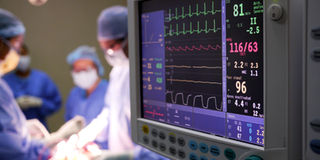600 heart patients miss out on surgery annually

Doctors operating a patient with a heart problem. Agency Photo
What you need to know:
- Among the adults, Dr Omagino said cardiovascular diseases are on the rise, such as Non-Communicable diseases due to lifestyle and body inactivity.
- Despite the recently granted autonomy status through the Uganda Heart Institute Act 2016, the cardiothoracic surgeon said the facility is also challenged with space coupled with inadequate number of intensive care units.
KAMPALA. The Uganda Heart Institute is seeking for a non-wage budgetary allocation of $7.5million (about Shs25b) in the next financial year if it’s to handle about 1,000 patients in need of either open or closed heart surgeries annually.
With the capacity to conduct 1,000 heart surgeries annually, Dr John Omagino, the director of the institute, told the Daily Monitor in an interview yesterday that the facility is unable to operate on about 600 patients due to lack of enough funds.
“We have capacity to operate on 1, 000 patients annually but because of the funding challenges, we are able to conduct surgeries on only 400 patients,” Dr Omagino said ahead of the World Heart Day cerebrations due tomorrow.
“What we are demanding from government is to increase our budget from about Shs6.7b to Shs25b to enable us operate to full capacity,” he said, adding that a single heart operation cost about Shs16m.
According to Dr Omagino, annually about 16,000 children in Uganda are born with heart defects and need immediate intervention of either open or closed heart surgeries if they are to survive.
“Our job is to detect all children born with defects and prepare to work on about 8,000, but we manage about 2,000 that come for evaluation,” he said.
He further added about 60 per cent of the children with heart defects who miss out on operation die before their fifth birthday, and those who live longer spend most time in-and-out of hospital suffering.
Despite the recently granted autonomy status through the Uganda Heart Institute Act 2016, the cardiothoracic surgeon said the facility is also challenged with space coupled with inadequate number of intensive care units.
“In our cardiac catheterisation unit, we have capacity to handle about five operations per day but because of space constraints, we only operate on two patients depending on the available beds to hold these patients after coming from theatre,” he adds.
He hopes that government will soon raise the $65million (about Shs220bn) required for the construction of a new home required to provide adequate space for clinical services, teaching, and accommodation for critical staff and also training fellows.
Among the adults, Dr Omagino said cardiovascular diseases are on the rise, such as Non-Communicable diseases due to lifestyle and body inactivity.
“One in every four adults has a raised heart pressure, which is quarter of our adult population and bigger than even HIV/Aids,” he explained.


